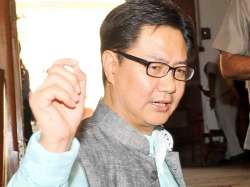BJP or its govt won't come in way of Naga pact, says Kiren Rijiju
"Our party and the government, if elected, will not come in the way of the smooth implementation of the Naga accord as and when it is signed. Rather we will cooperate," Rijiju said.

The BJP-NDPP coalition will not come in the way of "smooth implementation" of the proposed Naga accord, if voted to power in Nagaland, Union Minister of State for Home Kiren Rijiju Said today.
He, however, was non-committal when asked if it meant that the new government would recommend the dissolution of the Nagaland Assembly to pave the way for implementation of the accord, if necessary.
"Our party and the government, if elected, will not come in the way of the smooth implementation of the Naga accord as and when it is signed. Rather we will cooperate," he told PTI here. Rijiju is the BJP's election in-charge for Nagaland.
He said, in fact, no political party will come in the way of implementation of the final peace deal with the Naga insurgent group NSCN(IM), and this has been conveyed to all concerned in Nagaland.
When asked whether his comments meant a BJP-NDPP government, if formed after the February 27 polls, will recommend dissolution of the new Assembly and recommend fresh election, if necessary, Rijiju said it was not possible for him to comment on the issue.
He said it was a subject to be discussed and decided by the MLAs.
The minister said the central government was committed to an honourable solution to the seven-decade-old insurgency in the northeastern state, which is be acceptable to all.
Under the aegis of the Core Committee of the Nagaland Tribal Hohos and Civil Organisations (CCNTHCO), several political parties in Nagaland had initially decided not to contest Assembly elections and demanded their deferment till the time the issue was resolved.
Civil society groups in Nagaland had also launched a campaign 'Solution before Election'.
Not a single nomination was filed till the penultimate day of filing of papers on February 6 when first batch of 22 nominations were submitted after parties softened their stand.
The central government has already rejected one of the key demands of the NSCN(IM)-- integration of the Naga inhabited areas of Arunachal Pradesh, Assam and Manipur--into Nagaland, a very sensitive issue for the three northeastern states.
BJP is in power in the three states, which were opposed to the demand. Manipur had seen massive protests in 2001 after the then NDA government signed a ceasefire agreement with the NSCN-IM 'without territorial limits'.
After the protests, the central government was forced to decide that the ceasefire will be applicable only in Nagaland.
Last month, after the publication of a reported draft pact allegedly prepared by an RSS leader, suggesting separate authorities to execute development schemes in seven Naga inhabited districts of Manipur, two of Arunachal Pradesh, and one in Assam, violent protests were witnessed in Assam's Dima Hasao, leading to the death of two youths.
Expectations of lasting peace had soared in Nagaland, hit by insurgency for several decades, after the Centre and the NSCN-IM signed a framework agreement in 2015.
The National Socialist Council of Nagaland (Isak-Muivah) has been engaged in peace talks with the Centre's interlocutors since 1997, when it first announced a ceasefire agreement.
During a visit to Nagaland in November 2017, President Ram Nath Kovind had said the state was at the threshold of making history as a final agreement on the Naga political issue would soon be arrived at and lasting peace achieved.